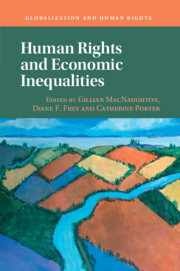Description
Human Rights and Economic Inequalities
Globalization and Human Rights Series
Coordinators: MacNaughton Gillian, Frey Diane, Porter Catherine
Language: English
Subject for Human Rights and Economic Inequalities:
Human Rights and Economic Inequalities
Publication date: 12-2022
Support: Print on demand
Publication date: 12-2022
Support: Print on demand
Human Rights and Economic Inequalities
Publication date: 09-2021
376 p. · 15.8x23.5 cm · Hardback
Publication date: 09-2021
376 p. · 15.8x23.5 cm · Hardback
Description
/li>Contents
/li>Biography
/li>
Economic inequalities are among the greatest human rights challenges the world faces today due to the past four decades of neoliberal policy dominance. Globally, there are now over 2,000 billionaires, while 3.4 billion people live below the poverty line of US $5.50 per day. Many human rights scholars and practitioners read these statistics with alarm, asking what impact such extreme inequalities have on realizing human rights and what role, if any, should human rights have in challenging them? This edited volume examines these questions from multiple disciplinary perspectives, seeking to uncover the relationships between human rights and economic inequalities, and the barriers and pathways to greater economic equality and full enjoyment of human rights for all. The volume is a unique contribution to the emerging literature on human rights and economic inequality, as it is interdisciplinary, global in reach and extends to several under-researched areas in the field.
Introduction Gillian MacNaughton, Diane F. Frey and Catherine Porter; Part I. Conceptualizing and Measuring Human Rights and Economic Inequalities: 1. Emerging human rights norms and standards on vertical inequalities Gillian MacNaughton; 2. Constraints on economic inequality: comparing Canada and the United States Rhoda E. Howard-Hassmann; 3. What the UN human rights treaty bodies tell us about economic inequalities and human rights: an empirical analysis of 20 years of practice Sylvain Aubry, Katherine James, Lucy McKernan, Beth Munro and Caroline Noyrez; 4. How can economists help human rights practitioners measure changes in economic inequalities? Catherine Porter; Part II. Causes and Consequences of Economic Inequalities: 5. A framework for fiscal justice: how human rights can change public finance Anja Rudiger; 6. Global tax justice and human rights Alex Cobham, Fariya Mohiuddin and Liz Nelson; 7. Growing inequality and risks to social rights in our new data economy Carmel Williams; 8. Caste, economic inequality and climate justice in India Dadasaheb Tandale; Part III. Socio-Economic Rights and Economic Inequalities: 9. Distributive justice, and economic and social rights Joo-Young Lee; 10. Fair wages and a decent living: paths to greater vertical equality Diane F. Frey and Gillian MacNaughton; 11. The right to social security and economic inequality: contested meanings and potential roles Beth Goldblatt; 12. Education, income inequality and the right to participate in cultural life James Murphy; 13. Implications of the health equity perspective for the right to health Chuan-Feng Wu; 14. The potential impact of the right to housing to address vertical inequalities Vicente Silva.
Gillian MacNaughton, JD, DPhil, is Associate Professor of Human Rights at the University of Massachusetts Boston, co-editor of Economic and Social Rights in a Neoliberal World (Cambridge University Press, 2018), and co-founder of the Collaborative Research Network on Economic and Social Rights in the Law and Society Association.
Diane F. Frey, PhD, is a lecturer in Labor and Employment Studies at San Francisco State University, co-editor of Economic and Social Rights in a Neoliberal World (Cambridge University Press 2018), and co-founder of the Collaborative Research Network on Economic and Social Rights in the Law and Society Association.
Catherine Porter is a Senior Lecturer in the Department of Economics, Lancaster University, UK. She has provided policy advice to the UK and Ethiopian Governments, the United Nations (UNICEF, UNDP) and the World Bank. Her latest project examines the unequal impacts of the Coronavirus pandemic in low income countries.
Diane F. Frey, PhD, is a lecturer in Labor and Employment Studies at San Francisco State University, co-editor of Economic and Social Rights in a Neoliberal World (Cambridge University Press 2018), and co-founder of the Collaborative Research Network on Economic and Social Rights in the Law and Society Association.
Catherine Porter is a Senior Lecturer in the Department of Economics, Lancaster University, UK. She has provided policy advice to the UK and Ethiopian Governments, the United Nations (UNICEF, UNDP) and the World Bank. Her latest project examines the unequal impacts of the Coronavirus pandemic in low income countries.
© 2024 LAVOISIER S.A.S.
These books may interest you

Tax, Inequality, and Human Rights 146.26 €



